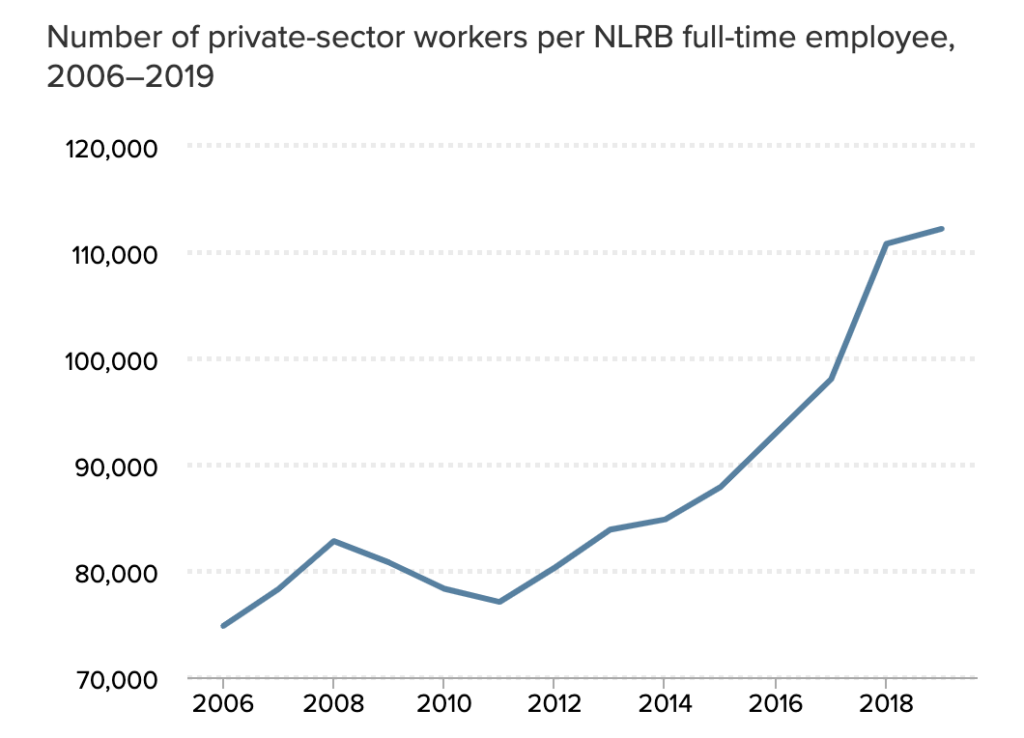
Tascha Shahriari-Parsa is a student at Harvard Law School.
The latest version of the government’s budget bill for fiscal year 2022 dispenses with increases in funding for the NLRB included in previous versions of the bill. The new version proposes maintaining the board’s funding at $274 million, the same amount the Board has been receiving since 2014 and much less than the $301.9 million the board asked for in May of last year. In real dollars (accounting for inflation), this means the NLRB is currently receiving $58 million a year less than it was in 2014, and over $20 million less than last year. Moreover, since 2006, the number of covered workers per NLRB staff person has increased by 50%. Only a third of NLRB employees believe they have sufficient resources and almost half believe their workload is unreasonable. “Congress has left us to wither on the vine yet again,” said one NLRB staffer, Michael Bilik. “The public will ultimately pay the price as we continue to shrink into oblivion.”

The budget bill also prevents the NLRB from instituting a system of electronic elections. In comparison, the National Mediation Board (NMB) and the Federal Labor Relations Authority (FLRA) have both implemented electronic elections, and the British Columbia and Ontario labor boards have instituted electronic voting in Canada. The older version of the house appropriations bill included “not less than $1 [million]” of the board’s yearly budget being put aside “to develop a system and procedures to conduct union representations electronically.” E-voting is important in large part because it gives employees more ability to democratically participate in union elections, and makes it harder for employers to interfere in them. Indeed, in a concurrence in the NLRB’s Aspirus Keweenaw decision in 2020, now chair of the Board Lauren McFerran suggested that it might be better to hold union elections somewhere other than the worksite, because it is “a space controlled by the employer.” Unfortunately, e-voting may not be a reality under the NLRB anytime soon.
AFL-CIO President Liz Schuler stated in an interview with Freakonomics Radio that the AFL-CIO had considered expelling the United Auto Workers (UAW) from the labor federation after serious corruption scandals came to light last year. After the U.S. Department of Justice became involved, the UAW entered a consent decree that involved the presence of an independent monitor, which also influenced the AFL-CIO’s decision to let the process play out instead of expelling the UAW. The UAW corruption also catalyzed movements in UAW for greater democracy, notably Unite All Workers for Democracy (UAWD) which ran a campaign for one-member one-vote (1M1V) that prevailed at the end of last year. “Unfortunately,” she said during the interview, “when a scandal like that happens, it takes people’s attention away from the fact that the labor movement fights for all working people, not just our members.” In a statement, AFL-CIO spokesperson Carolyn Bobb walked back on Schuler’s words, denying that there had been formal deliberations about expelling UAW and stating that the AFL-CIO is “proud to have the UAW as an affiliate.”
A piece earlier this week in The Real News Network highlights ways in which gig workers have organized in Canada to build collective power and seek justice. Gig Workers United, affiliated with the Canadian Postal Workers Union, describes itself as “organizing for the transparent pay, livable wages, improved health and safety conditions, and labour protections we deserve.” After Uber Eats worker Saurabh Sharma was subjected to an illegal clawback by Uber (he delivered two orders with a payout of $265.26, but uber reduced it to $45 after the orders), Gig Workers United won a ruling from the Ontario Ministry of Labour on February 22 that Sharma was an “employee” under Ontario’s Employment Standards Act.
A week later, the Ontario government publicly released the “Digital Platform Workers’ Rights Act” that would raise the minimum hourly rate of app-based drivers to $15 hourly when they are actively driving individuals to their destination. On his The Law of Work blog, our very own David Doorey argues that the Ontario law could be a step backwards given the ruling from the Ministry of Labour. “If Uber drivers and other similarly situated “gig” workers are already ‘employees,’ (as I and many others believe)” David wrote, “then a new law that carves them out of existing legal entitlements for ‘employees’ is a regressive step that would make the workers worse off than they are at present.”
Coffee drinking is peaking in the United States, with two-thirds of the U.S. population now drinking coffee every day compared to 58% in 2021, seemingly as a result of high labor force participation rates. Past studies have found relationships between work hours and caffeine intake.






Daily News & Commentary
Start your day with our roundup of the latest labor developments. See all
July 9
In Today’s News and Commentary, the Supreme Court green-lights mass firings of federal workers, the Agricultural Secretary suggests Medicaid recipients can replace deported farm workers, and DHS ends Temporary Protected Status for Hondurans and Nicaraguans. In an 8-1 emergency docket decision released yesterday afternoon, the Supreme Court lifted an injunction by U.S. District Judge Susan […]
July 8
In today’s news and commentary, Apple wins at the Fifth Circuit against the NLRB, Florida enacts a noncompete-friendly law, and complications with the No Tax on Tips in the Big Beautiful Bill. Apple won an appeal overturning a National Labor Relations Board (NLRB) decision that the company violated labor law by coercively questioning an employee […]
July 7
LA economy deals with fallout from ICE raids; a new appeal challenges the NCAA antitrust settlement; and the EPA places dissenting employees on leave.
July 6
Municipal workers in Philadelphia continue to strike; Zohran Mamdani collects union endorsements; UFCW grocery workers in California and Colorado reach tentative agreements.
July 4
The DOL scraps a Biden-era proposed rule to end subminimum wages for disabled workers; millions will lose access to Medicaid and SNAP due to new proof of work requirements; and states step up in the noncompete policy space.
July 3
California compromises with unions on housing; 11th Circuit rules against transgender teacher; Harvard removes hundreds from grad student union.